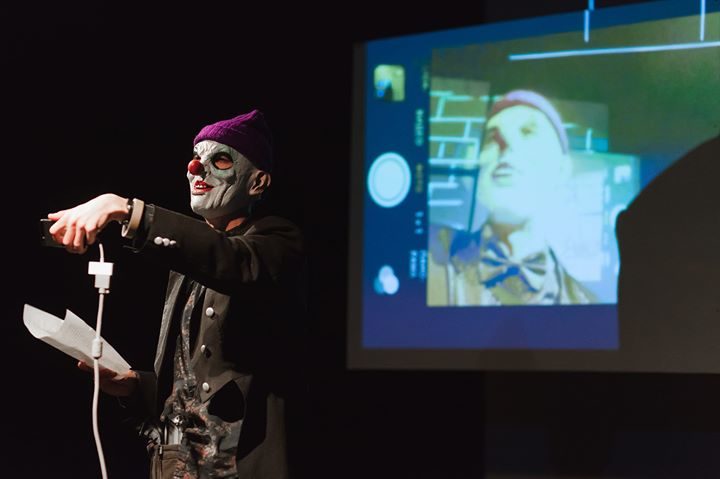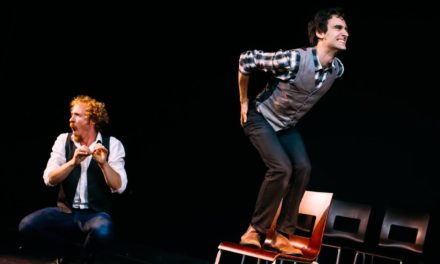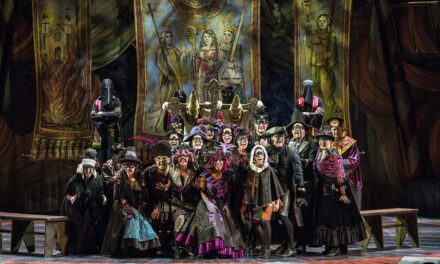Theatrical season of 2016-2017 finally brought post-dramatic theater to Ukraine. With a significant delay in time, and marked with local specifics, this fresh stylistic trend reached our stages. So, what is “post-dramatic theater” exactly? Generally speaking, this term embraces all kinds of performances free from traditional drama structure, but still lying within the framework of theater as an artistic form. The post-dramatic theater is chaos, permissiveness, actuality, provocation, and neglect of any tradition. And of course, a new form of theatrical performance gave life to a new type of play writer.
Inside the industry, you are considered to be a writer. But you don’t write any plays – how is it possible?
I did write but gave up. I stopped writing plays because no one was going to put them on stage. But lately, I took part in theatrical projects (My granpa dug, my father dug, I won’t, DPU [Youth Preservice Training], End of Hypocrisy) that give a chance to reconsider the role of writer.
These projects use a different type of work with theatrical text. I rearrange text, work with context, related language and theme. This world is full of texts. I compile existing versions. It is a rather comfortable position because I don’t need to write.
What does it mean, technically? Do you accumulate dictaphone recordings, make shorthand notes, develop scripts?
First of all, I work with original sources. But in any case I do it together with actors, or whoever is going to be on stage, i.e. with participants of the performance, so-called “donors.” Their stories, their inner world that they want to share, is my material. We get together, we discuss and accumulate the materials. Mostly, I make my own selection, although it is always done in a friendly atmosphere. By no means do I ever push or censor. But sometimes it may become a problem. My job is to accumulate documentary text materials and draw attention to a certain topic. For example, if we talk about historical memory as a cultural phenomenon, we should learn who has worked on this issue earlier. The topic may have been addressed by a philosophical research, as well as explored by mass culture. There is no certain methodology here, just a feeling of the rhythm of life, that pulsates around us. All I do is compile the text, that will be accepted, understood, and related to the heartbeat of a modern individual.

, Independent theater project “Maps of fear / Maps of identity.” Photo: Oleksandr Dolovov, Ivan Zavtatalyuk, and Valeriya Landar
What does it mean, to work on a topic?
It means that I create a logical corridor with certain chain of “rooms” that I enter. Inside you can find some images created by different authors, certain aesthetics or ideology. For example, if we investigate the topic of memory, we can research how it was handled in the times of Stalin, and touch a more recent phenomenon of “erasing” the memories.
You seem to be very interested in the problem of memories?
I am, indeed. It is a fruitful field for research and interpretation. We have to understand that any government has a monopoly of interpreting all kinds of events on the state level. It is quite exciting for me as an artist to try to resist that. Resist the governmental attacks on our memory. This question was raised in My granpa dug, my father dug, I won’t. Generally speaking, the performance puts personal, intimate experiences of every performer against the ideological structure, that keeps coming to life again and again, like a monster hydra.
Why did you mention government? Do you feel oppressed by current officials, or is it an inherited sense of ideological pressure?
I’d say, the first reason, because I cannot figure out, if the latter works with me. There is no doubt that any government oppresses and influences its citizens. Its very nature tends to take control and monopolize the past. By monopolizing I mean imposing certain interpretation patterns, applied to historical events, personalities etc. I cannot avoid feeling it.
What is an audio tour? How does it work?
I think, the audio tours we created together with Petro Armyanovski are very close to the immersive theater. By prior arrangement on social media, a group of people comes together in a certain place. Everyone takes a set of receiver and headphones. The voice in the headphones tells a story and gives instructions where to go, or what to do. The tours are created in close cooperation with modern composers. Johnny Fox composed music for Case of Mendel Beilis and Walk through Maidan. Margaryta Kulichova, a Ukrainian composer, joined us for making Catcher in the Rye audio tour, that was a part of 86 Festival in Slavutych. So, there are three components in our tours: narrative, interactive, and performative.

Audio tour Case of Mendel Beilis. Photo: Oleksandr Dolovov, Ivan Zavtatalyuk, and Valeriya Landar
You already have three of such tours. Which one was the first?
Case of Mendel Beilis. It is a story of a Jewish brick factory worker from Kiev, who was accused in the ritualistic killing of a Christian boy. It took two long years of trial before he was acquitted. We created a route through the city based on places, significant for this trial. In our audio tours, we closely follow the story, and try to recreate the routes that people took at those times. The second story is about events on Maidan in 2014. The third one is called “Catcher in the Rye” and dedicated to the town of Slavutych. When I came there together with Petro, we realized that it’s an ideal place for a perfect childhood. There are lots of health centers and playgrounds. Slavutych is the youngest town in the former Soviet Union, it was built after the explosion on Chernobyl nuclear power station. Builders came from seven different republics of USSR: Latvia, Lithuania, Georgia, Russia, Armenia, Azerbaijan, and Estonia. So, we came up with the idea that the main character for this town must be a courageous teenager who strives for justice and has a nose for insincerity. But the only thing that connects our work with Salinger’s book is the name.
What is theater and non-theater, to you? Where is the line between these two? What do you say to those who refer to your audio tours as non-theater?
In fact, it’s not a question for me at all. I have no intention to determine my identity in conventional theatrical terms. I don’t want to be called a drama writer, or theatrical personality, or be anyhow related to the notion of “theater.” That is why our experiments in audio tours can truly be called “non-theater.” No problem. I don’t mind.
Are there any things that you are ready to defend out of principle?
I am annoyed and amused at this naïve, almost infantile reality that surrounds us. If we are talking about this “theatrical shell,” theatrical world, it is tightly sealed inside itself. The rare times when the seal is broken, and theater “leaks” to a broader social life are the times when theater stops being only theater. For example, recent scandal with Holocaust cabaret performance became a trigger for a broader discussion. It turned out, that theater keeps on existing, theatrical events keep taking place, performances keep running. There is even some media coverage, but not in the form of announcements or reviews. The announcement does not contain information about the show or what happens next. Suddenly, society needs interpretation, to refresh people’s memory, to remember what is a drama play, and where are its borders. That is why I think the guys who put up that show did a right thing.
Are you going to write more plays?
I have an idea, but I will only write it down if I get paid. I became a very materialistic guy. Everything I do for the theater I do for the money. From time to time, I receive some offers from the theatrical community, but I refuse to work for free, it makes no sense. I’d better write for my own pleasure. Which I don’t do either.
You have just desacralized the figure of “creator” in art. I avoid working for free, too. But my trade is far from high art…
Maybe I’m in the middle of a crisis, or maybe I wasn’t ever gifted in writing. Or maybe I’m lying to everyone? I think I’m pretty good at it. I’m a professional liar. It’s very hard for me to write. And it’s a question of language in the first place. I write in Russian. I need certain conditions and surroundings. There has to be a rather convincing reason why I start a certain topic, if it’s not about money.
You have recently worked as a writer at “DPU” project, together with “Prekrasnye Tsvety” (Beautiful Flowers) theater from Kharkiv and NGO “Liniya Soglasiya” (Agreement Line). It was shown in Kyiv, too, but “Liniya Soglasiya” refused to give me video materials. What can you say, why could that happen?
No doubt,”DPU” is an example of collective work. My role as a writer is not a leading one, in this project. “DPU” is a result of bringing together lots of people. A great job was done by our military partners, we had done several projects before, together with NGO “Liniya soglasiya.” I was invited at the last moment.
But why do they keep video materials to themselves? Did you annoy someone?
Of course, I can be annoying, many people dislike me. But we made a good show. And it’s not about videos. Most important, it’s a successful project. I cannot comment on this kind of behavior. Obviously, we need an institution not only for educating writers, but also for curators. Curators need to keep up ethical relations in a professional environment. Refusing to provide video is not a wise move.
By the way, speaking of education. I have come across information, that you began to teach. What do you teach your students?
The current year is the year of Kharkiv to me. It was the place I started teaching. In Kharkiv, there is “Tisto” acting school. Ihor Klyuchnyk, an actor of “Prekrasnye Tsvety” theater, is a beating heart of this school. After “DPU” project he invited me to work with students from “Tisto.” My first teaching experience took place in March. I developed a special intensive course, “Hey, Where Is Your Story?!” I liked this very much, and feel big potential as a teacher in myself. In this course, I included some theses that I developed through my works. They touch issues of public and virtual spaces, and their functions. Where is the story in these spaces, and what is a story. How social media works with a story, what mass culture does to it, and what it consists of. We try to disintegrate a story and then pull it back together, like legos. In fact, all my lectures were dedicated to this. In the end of May, we will repeat this intensive course, with the same students. Moreover, Alla Zamanska, a teacher at Kyiv National Theater, Cinema and Television University, offered that I read this course to extra-mural students. This educational project is supported by Heinrich Böll Fund. We will research how the story works in the city, on the example of Mendel Beilis Story: first, we make an audio tour for the students, and then analyze its structure.
This article was originally published on theater-ua.com. Reposted with permission. Read the original article.
This post was written by the author in their personal capacity.The opinions expressed in this article are the author’s own and do not reflect the view of The Theatre Times, their staff or collaborators.
This post was written by Anastasiia Gaishenets.
The views expressed here belong to the author and do not necessarily reflect our views and opinions.


















